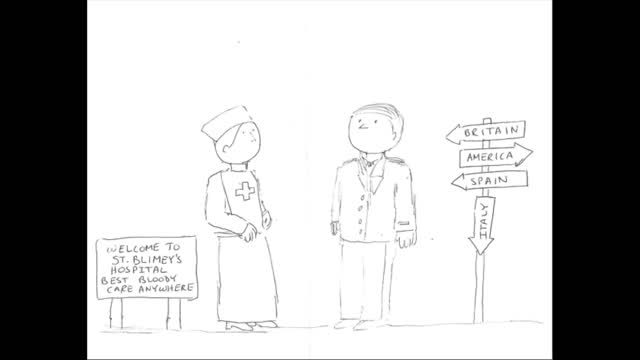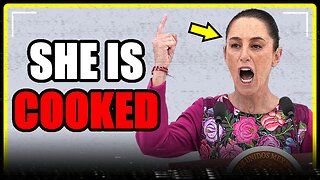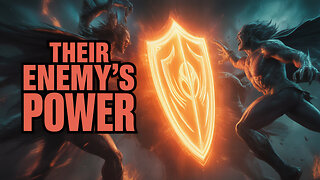Premium Only Content

A Farewell to Insomnia
Inspired by a conversation a troupe member of ours had with one of his friends. The troupe member said that he often went to used bookstores and purchased books to read as an inspiration to write comedy skits. When asked, he gave her a list of his books that was then on his list. One of the books was Earnest Hemingway’s “A Farewell to Arms.” She said something to the effect of “Oh, dear.” This troupe member immediately moved the book to the top of his read list. The move proved to be a wise move, because the novel was such wonderful target of ridicule. Much of the silly dialogue in this sketch was actually inspired by Hemingway’s very own silly dialogue. In the skit we borrowed from Chapters 4, 5, 6, 12, 13, 14, 16, 18, 25, 34 and 35.
Scrolling Caption and Voiceover: “In 1929, to counter its postwar decline in sales, Scrivener’s Magazine senior editor Mr. Bartleby made a bold anti-authority preference and commissioned a salacious and scandalous work from Mr. Bernie Sewing-Gay, an aspiring young plagiarist of overrated American arrant fantasies with a dime store novel plot, grammar school level dialogue...”
Scrivener’s Magazine is a spoof of Scribner’s Magazine, which serialized Mr. Hemingway’s novels. Scribner’s Magazine was owned by Charles Scribner and Sons, who published Ernest Hemmingway's novels. “Mr. Bartleby” is a reference to the short story “Bartleby the Scrivener” by Herman Melville (of “Moby Dick” fame). Rather ironic since “Bartleby the Scrivener” was famous for preferring not to do anything.
The June 1929 issue of Scribner’s Magazine was banned in Boston, Massachusetts, due to "A Farewell to Arms" by Ernest Hemingway. We guess that means that folks in Boston can put up with bad words, but that doesn’t necessarily mean that they can stand bad dialogue.
Voiceover: “…and featuring a shell of a heroine that was treated with spite as a personal vendetta against a woman who wouldn’t sleep with the author.” - In a 1976 interview with Henry Villard, Ms. Agnes Von Kurowsky, who was very likely the inspiration for Catherine Barkley in Hemingway’s “A Farewell to Arms” objected to the “depiction” of her in “A Farewell to Arms.” Ms. Von Kurowsky said “she wasn’t that kind of girl.” She objected to the suggestion that she and Hemingway were lovers, said that Catherine Barkley was “an arrant fantasy, and that having a love affair in a hospital was “totally implausible.” (i.e., having sex with a man in a shrapnel-damaged leg in a splint in a very small hospital bed in a hospital with absolutely no privacy). Henry Villard was in fact hospitalized alongside Hemingway in 1918.
In 1966, Ms. Von Kurowsky and her husband in fact had to move from her home in Key West, Florida (she actually lived in the same town as Ernest Hemingway while he was alive, but their paths mysteriously never crossed) for reasons of privacy; every time a tourist trolley passed by her house, the driver called out to tourists that that was the home of “Ernie’s girl.” She really hated that. So it appears in this instance, Mr. Hemingway’s “fantasy” did more harm than good.
Miss Fart-Clean: “Are you here in Italy so you can blow up a bridge in Spain?”
Harry: “No, ma’am. You’re mistaking me for a hero from another dime store novel. I drive an ambulance for the Italian Army.”
Miss Fart-Clean: “Oh.”
A reference to Hemingway’s novel “For Whom the Bell Tolls.”
Harry: “I believe we have a common acquaintance, Lieutenant Vecchio Sporco, the surgeon.” - "Vecchio sporco" is Italian for “dirty old man.” His real counterpart, Lieutenant Rinaldi, was indeed a dirty old man. In the novel, for instance, he would grab Lieutenant Frederic Henry’s knee and call him “baby.”
Miss Fart-Clean: “How many people have you ever loved?”
Harry: “Nobody. You’re my good girl.”
Miss Fart-Clean: “Not even me?”
Harry: “Yes, you. You’re my good, lovely girl.”
Miss Fart-Clean: “And how many have you…stayed with?”
Harry: “None. You’re my good, lovely, grand girl.”
Miss Fart-Clean: “You’re lying. I can hear it in your adjectives…”
Harry: “Yes, I am. You’re my good, lovely, grand, fine girl.”
Miss Fart-Clean: “I thought so. And have you ever told her you loved her?”
Harry: “Yes, my good, lovely, grand, fine, simple girl.”
Miss Fart-Clean: “You’re lying again.”
Harry: “Of course, my good, lovely, grand, fine, simple, lovely girl.”
A spoof of Chapter 13, where Frederic repeatedly lays on simple, silly sentences to Catherine (“You’re my good girl,” “You’re a lovely girl,” “You’re a grand girl,” “You’re a fine simple girl,” and “Oh, you’re a lovely girl.”).
Miss Fart-Clean: “How was it at the front?”
Harry: “Terrible. Our Lieutenant friend kept calling me “baby,” and told me he loved me. Asked me to take my pants off and kiss him. Was disappointed to see that they returned me to the battlefield without complete articulation in my knee. Told me to keep articulating my knee down the field, then muttered something about ‘65 toss power trap, it might pop wide open’” - Reference to Hank Stram’s famous “Mic’d Up” session at Super Bowl IV on January 11, 1970.
Miss Fart-Clean: “You could have blown up that bridge if you took that job in Spain…”
Harry: “Shut up. Then the carabinieri captured me. They thought I was a German spy. But I eluded them by jumping into the river. I hooked onto an 18-foot plank, and it towed me out to sea for three days before I wore it out and killed it by running it through with a 15-foot marlin and escaping to shore.”
Miss Fart-Clean: “Praised be Joe DiMaggio.”
A reference to Ernest Hemingway’s “The Old Man and the Sea.”
Harry: “Yes, indeed. From there I hopped a train to Pamplona to watch the running of the bulls so that I could exercise my freedom from the manacles of oppression by loafing about, fishing, drinking and eating to excess while inexplicably never running out of money, and carousing around at all hours with a V.A.D. I met at a hospital during the war whose own true loved kicked the bucket. From there, I hopped a train here… so that I could exercise my freedom from the manacles of oppression by loafing about, fishing, drinking and eating to excess while inexplicably never running out of money, and carousing around at all hours with a V.A.D. I met at a hospital during the war whose own true loved kicked the bucket…”
Miss Fart-Clean: “That was very environmentally responsible of you darling. Recycling is good, especially plotlines.”
Harry: “Yes…”
The first half of Harry’s dialogue refers to Hemingway’s 1926 novel “The Sun Also Rises.” The V.A.D. in that book Lady Brett Ashley. Lady Brett Ashley’s true love died of dysentery, while Catherine Barkley’s true love died at The Battle of the Somme. SO not only was the dialogue in “A Farewell to Arms” terrible, but so was the plot; so dreadful in fact Hemingway had to steal from one of his own books just to keep the story afloat.
“Jean van Eyck was here too.” – The picture was from Jan van Eyck’s oil painting “The Arnolfini Portrait.” The painting is signed, inscribed and dated on the wall above the mirror "Johannes de eyck fuit hic 1434" ("Jan van Eyck was here 1434").
References:
Encyclopedia Britannica. (10 April 2024). A Farewell to Arms. https://www.britannica.com/topic/A-Farewell-to-Arms-novel#ref1273841
Hemingway, E. (1987). A Farewell to Arms. Collier Books. First published in 1926.
Hemingway, E. (2003). The Sun Also Rises. Collier Books. First published in 1929.
Wikipedia. https://en.wikipedia.org/wiki/Arnolfini_Portrait
YouTube.com. Super Bowl IV Mic'd Up: NFL Coaches React to Hank Stram & His Chiefs |
NFL Films Presents. https://www.youtube.com/watch?app=desktop&v=OPAcT2KBupI
-
 2:01:31
2:01:31
Side Scrollers Podcast
18 hours ago“Make FPS Great Again” MELTDOWN, Relooted ROASTED by EVERYONE + More | Side Scrollers Live
4.21K4 -
 LIVE
LIVE
The Sufari Hub
1 hour ago🔴WHATS GOING ON NEW YORK || Marvels Spider-Man Miles Morales || COME JOIN US IN THE FIGHT!
47 watching -
 LIVE
LIVE
Biscotti-B23
5 hours ago🔴 LIVE THOUSAND YEAR BLOOD WAR DLC EARLY ACCESS 🔥 RANKED MATCHES ⚔ BLEACH REBIRTH OF SOULS
274 watching -
 1:59:22
1:59:22
The Michelle Moore Show
1 day ago'Death of A Lot of Things Now, War Empowers BAAL, Plan B Must Be Disarmed, This Will Make or Break President Trump' Guest, Lt. Mark Taylor: The Michelle Moore Show (June 9, 2025)
19K25 -
 LIVE
LIVE
Game Galaxy
4 hours agoGame Galaxy OSRS Hardcore Duo ✨
37 watching -
 8:59
8:59
MattMorseTV
13 hours ago $1.36 earnedMexico's President just made a BIG MISTAKE.
59.1K63 -
 2:40:04
2:40:04
sophiesnazz
14 hours ago $0.26 earnedPLAT RANKEDDDDD !socials
4.49K1 -
 4:24:28
4:24:28
GloryJean
19 hours agoMotivational Monday! Frying on MnK 🖱️ 6.7 K/D
2.32K1 -
 10:18
10:18
Truther Steve
12 hours agoDO Christians REALLY Know Their Enemy's Power?
3.68K2 -
 12:30
12:30
Actual Justice Warrior
12 hours agoLong Island Prankster Is Going To JAIL
5.08K12